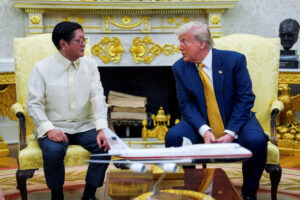By Kenneth Christiane L. Basilio, Reporter
US PRESIDENT Donald J. Trump might have placed little emphasis on Washington’s decades-old alliance with the Philippines when he modestly cut tariffs on Filipino goods, political analysts said on Wednesday, but ties between the two nations are unlikely to unravel over the trade deal.
Manila’s inability to secure a larger tariff cut from the US could raise concerns over Washington’s willingness to provide concessions and economically reward its allies, said Justin Keith A. Baquisal, a national security analyst at FACTS Asia.
As this developed, the US Embassy in Manila, citing the US State department, said the Philippines would get at least P3 billion ($53 million) worth of funding from the US to support its energy, maritime and economic growth programs.
Mr. Trump on Wednesday said the US had reached an agreement with the Philippines to set a 19% tariff on the country’s exports, a percentage point lower than the 20% that he dangled ahead of the Aug. 1 deadline. The Philippines was initially levied a 17% rate in April.
“Trump missed an opportunity to reward or put a premium on its most agreeable partner in ASEAN (Association of Southeast Asian Nations),” Mr. Baquisal said in a Viber message. “There seems to be no alliance discount.”
Manila and Washington are long-time allies, and their security ties are anchored on a 1950s Mutual Defense Treaty that obligates both nations to come to each other’s aid in case of an armed attack in the Pacific, including the South China Sea.
President Ferdinand R. Marcos, Jr. last week left the Philippines for an official trip to the US, where he held investment talks, security discussions and trade negotiations on the tariff placed by Washington on the Southeast Asian nation.
Mr. Trump’s aggressive tariff policy is part of Washington’s toolkit to reinforce US global influence and curb the rise of rival economies like China, said Josue Raphael J. Cortez, who teaches diplomacy and governance at De La Salle-College of St. Benilde in Manila.
“With the imposition of new tariff schemes, Washington is clearly trying to ensure that it would still have the upper hand,” he said in a Facebook Messenger chat.
The Philippines, US and their allies have been boosting cooperation by holding joint naval drills and patrols in the South China Sea to counter Beijing’s increasing assertiveness in the waterway.
China claims nearly the entire South China Sea through its so-called nine-dash line, a sweeping assertion that overlaps with the exclusive economic zones of Southeast Asian nations such as the Philippines, Vietnam, Malaysia and Brunei.
In 2016, a United Nations-backed arbitral tribunal in The Hague voided China’s expansive claims, ruling in favor of the Philippines. China, however, has rejected the ruling.
‘ALLIANCE CARD’The outcome of the tariff negotiation suggests that Manila’s strategic alliance with Washington carried little weight at the bargaining table, said Chester B. Cabalza, founding president of Manila-based think tank International Development and Security Cooperation.
“The alliance card did not work, but the Philippines must continuously cultivate its own economic security to maintain the momentum of its fast-growing economy,” he said via Messenger chat.
“Washington has its own economic prerogatives and policies to protect its own domestic market and international economic interests,” he added.
Despite the deal’s outcome, Philippine-US military relations are expected to remain ironclad, Victor Andres C. Manhit, president of think-tank Stratbase-ADR Institute, said in a Viber message.
Mr. Trump said in a Truth Social post that the two nations would work together militarily, as they are set to celebrate 80 years of diplomatic relations next year. Mr. Marcos said at the start of their meeting at the White House that the US is Manila’s “strongest, closest, most reliable ally.”
“He was affirming the commitment of the US to the region… as the Indo-Pacific is America’s priority theater,” Mr. Manhit said, noting that Mr. Trump’s statement could pave the way for greater deployment of US assets and increased investment in the country’s defense sector, alongside an expansion of joint exercises and maritime patrols in the region.
The US Embassy announcement came after the July 21 meeting between Mr. Marcos and US Secretary of State Marco Rubio in Washington, DC.
The US State department was also looking for congressional approval of about P825 million ($15 million) to bolster private sector development in the Luzon Economic Corridor, it said.
“If approved, this funding will support investments in the areas of transport, logistics, energy and semiconductors that will help create jobs and drive economic growth in the country,” it added.
The Luzon Economic Corridor is a trilateral agreement among the Philippines, US and Japan that seeks to boost the connectivity in key Luzon sites such as Metro Manila, Batangas, Subic and Clark.
It is also part of a broader collaboration supported by the G7 Partnership for Global Infrastructure and Investment.
The embassy added that the P3-billion allocation was the “first announcement of new foreign assistance for any country since the Trump administration began its review and realignment of foreign assistance in January.
Also on Wednesday, Philippine Defense Secretary Gilberto C. Teodoro, Jr. said the Philippines and US are looking at “nuancing” the annual Balikatan (shoulder-to-shoulder) war games to boost interoperability and make it better aligned with regional security threats.
“A major part of the takeaways from this trip [was] enhanced cooperation, including assurance of support for our continuing modernization of the military, our armed forces through the Philippine sectors,” he told a news briefing after the Philippine delegation’s meeting with Mr. Trump, based on a transcript from the Presidential Communications Office.
The Balikatan has in recent years grown in scale and increasingly featured advanced weaponry, as Manila and Washington seek to strengthen security cooperation and enhance force interoperability in response to China’s growing military presence in the region. — with Adrian H. Halili
